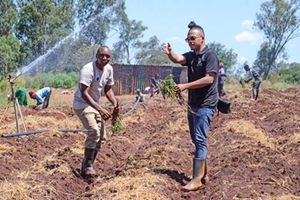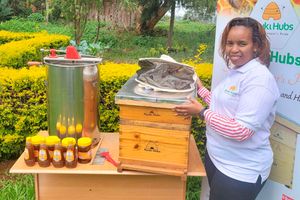
Charles Chelagat, at his farm which is tilled, ready for planting, at Karona in Moiben Constituency, Uasin Gishu County on May 22, 2024.
If your farm's soil is sick, no amount of prayer, pesticides, or perfect weather will bring a bumper harvest. That’s not a proverb — it’s the blunt truth facing millions of Kenyan smallholders. Year after year, we till tired land, sprinkle blanket fertilisers, and hope something grows. But what if we stopped guessing and started knowing? What if your soil could speak — in real-time, in your local dialect, through your phone?
That’s the promise of a new generation of data-driven, AI-powered innovations unveiled at the Data4SoilHealth and Soil Health Innovation Challenges held in Nairobi in June. "We’re treating soil like dirt while our children go hungry," a soil scientist at the summit put it starkly.
He wasn't exaggerating. Kenya loses an estimated Sh390 billion each year to degraded soils. That’s nearly the entire health budget, wasted underground. The causes are many: over-fertilisation, acidification, and carbon depletion.
The statistics paint a stark picture. Sixty-five per cent of Kenya’s soil is acidic and degraded, reports from Kenya Agricultural and Livestock Research Organization (KALRO) say. The average Kenyan farmer is 60 years old. Nutrient depletion, rising acidity, and decades of unsustainable farming have left millions of smallholder farmers with diminishing yields and rising costs.
And despite government plans to spend Sh19 billion on fertiliser subsidies, much of it may be money down the drain without proper soil testing. But perhaps the most maddening problem? Farmers are still flying blind.
"98 per cent of Kenyan farmers don’t test their soils. It’s like prescribing medicine without knowing the illness," said Brian Bosire, the founder and innovator at Ujuzi Kilimo.
The reason is simple: testing is slow, expensive, and far away. One national lab serves hundreds of thousands of farmers. Results take up to four weeks. By then, the rains have started, the planting season has slipped by, and the fertiliser — often the wrong one — is already in the ground.
Enter Rhea Soil Health Management, a startup co-founded by soil scientist Priscilla Wanjira Wakarera. Their AgriPad analyser delivers lab-grade results in 15 minutes. Not in Nairobi, but right at the shamba. The kit uses AI to adjust for moisture and soil type, then pings you custom fertiliser recommendations on WhatsApp.
Another innovator, Kiduka Research Labs, wants to cut analysis time to just 48 hours through the use of community "digital champions".
"AI cuts testing time from 14 days to 15 minutes," Wanjira said. "For smallholders living season to season, that’s the difference between starvation and surplus."
And it’s not just about speed. It’s about relevance. Farmers like Mr Mark Barasa, from Western Kenya, who used Ycenter Shambah Solutions' mobile soil kit, discovered their soil didn’t need the government-subsidised NPK 17:17:17 fertiliser. It needed lime and organic matter. After following AI-powered advice, his maize yield jumped from 9 to 22 bags an acre.
He then asked the kind of question that stops policymakers in their tracks: "Why doesn’t the subsidy match what my soil actually needs?"
With agriculture contributing 21 per cent of Kenya’s GDP and employing 60 percent of the rural population, these innovations address the root cause of low productivity: degraded soils. By combining AI, IoT, and policy reform, they offer a blueprint for data-driven agrarian transformation.
Over 24 innovators pitched their tools at the summit. Some were startups. Others came from universities, government labs, even global research networks. But they all shared one mission: turning soil from mystery into measurable data.
There was Earth Guard’s national scoring dashboard — think a credit score, but for your farm's soil. There was Ujuzi Kilimo’s SoilPal, a three-minute tester delivering SMS tips. FieldWise from Vassar Labs used satellite imagery and machine learning to predict pH and phosphorus across entire counties. Meanwhile, Soil-Sense linked fertiliser efficiency to carbon credit income — turning healthy soils into money-making assets.
But what made these tools different wasn’t just the tech. It was the farmers at the centre of the design.
"Our models send advice via SMS and USSD," said one developer. "Why? Because apps are useless if you’re farming in Turkana with no data bundles."
Voice-enabled dashboards, local dialect support, and field agents were common threads. Kiduka Research Hub even hired youth to collect soil samples and connect farmers to agro-dealers. "We’re replacing guesswork with granularity — and creating jobs in the process," their lead explained.
Yet no matter how advanced the tools, many innovators pointed to the same obstacle: policy. Substantial public funds — Sh19 billion a year — go to fertiliser subsidies, but often without confirming if the fertiliser matches soil needs.
"We’re spending Sh19 billion on subsidies, but it’s pointless if fertilisers don’t match soil needs. Your innovations must bridge this gap," said Mutahi Kagwe, Cabinet Secretary for Agriculture. "I wasted money for years using the wrong fertilisers until soil testing revealed the truth. Now, the difference in my farm is ‘life and death’."
His words echoed personal frustration — and a national imperative. Without data, farmers lose money and the government risks pouring resources into the wrong solutions.
“Kenya’s soil degradation crisis is not just an agronomic issue — it’s a matter of economic stability and food security,” said Dr Paul Kipronoh Ronoh, Principal Secretary at the State Department for Agriculture.
“By investing in soil data systems and innovative technologies, we can equip farmers with the tools they need to boost productivity and sustainability.”






